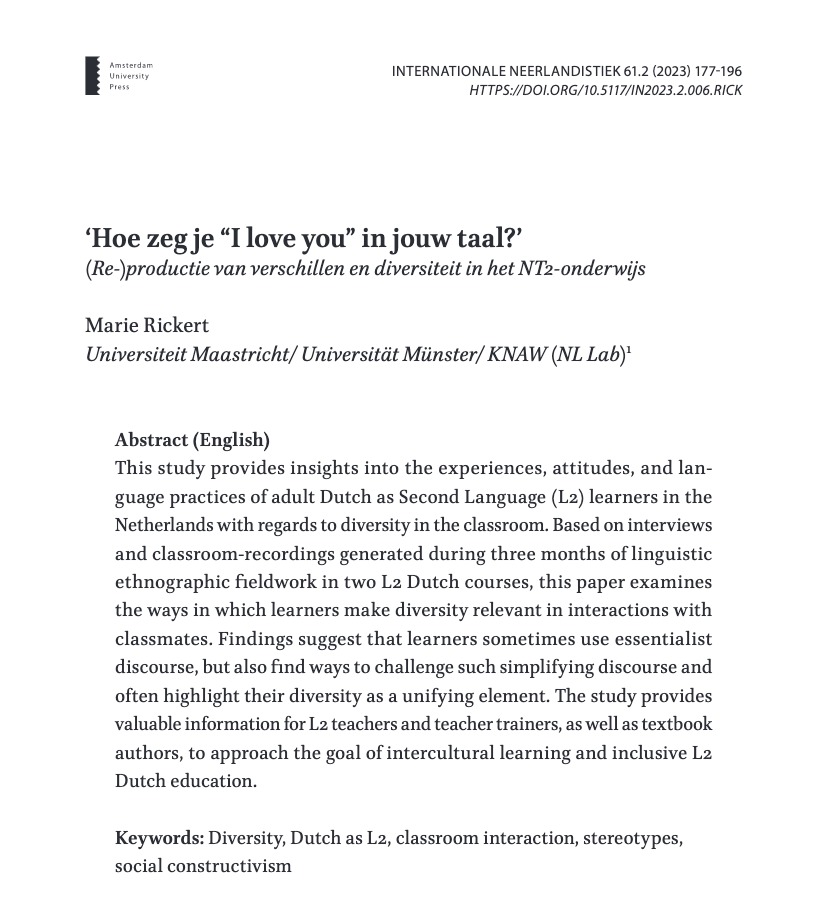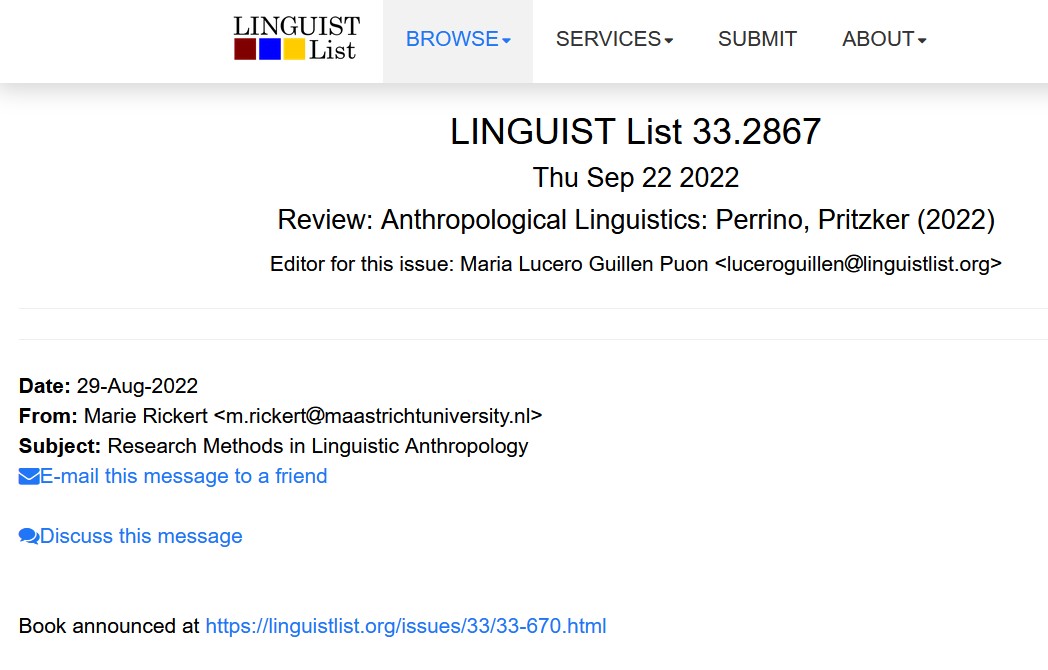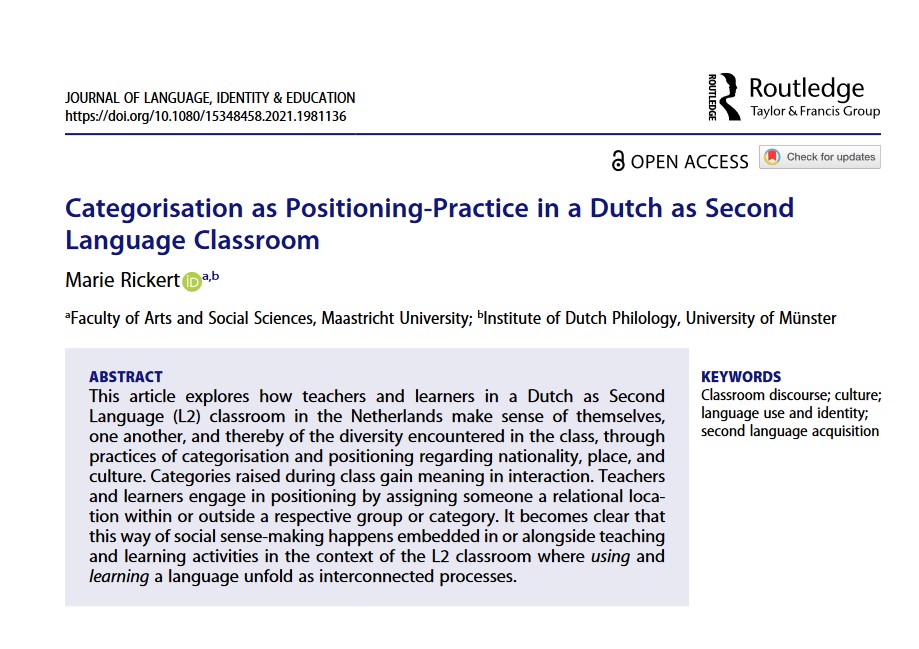Disciplinary identifications
As a linguistic anthropologist, I aspire to gain a deeper understanding of the ways in which language functions in interrelation with social and cultural practices like identifications, processes of inclusion and exclusion, social differentiation, and the construction of belonging. Therefore, I study language use as it unfolds in interrelation with language policies and ideologies. I approach these complex phenomena through the lens of situated interaction in real-life contexts and ground my work in linguistic ethnography. In order to better understand how people give meaning to their practices and lifeworlds, I engage with my research participants in the contexts of their daily life over time in the scope of linguistic ethnographic fieldwork. While I conduct participant observation, sometimes in combination with audio-/video-recordings, and interviews, I build rapport with my participants and become part of the settings I am researching. In my scholarly practice, I strive to learn from these experiences and reflexively integrate them into my analysis whenever fruitful.
Research theme
The underlying theme of my research is the broad interest in the processes through which novices become part of communities or not, mediated through language practices. In this context, I am particularly interested in participatory processes in educational settings. Educational institutions commonly act upon hierarchical orderings of language which are also represented in society, and they simultaneously contribute to the spread of (often dominant) language ideologies in turn, making these highly relevant research fields. My research thus far is mainly concerned with two different groups of novices: Children and Second Language Learners. These two groups are united by their emergent interactional repertoire and their position as relatively new members of society, either as (recently) born into it or as newcomers and/or in the position of language learners of the national language.
Publications
A list of work in progress and papers under submission is available upon request.
2024
2023
-
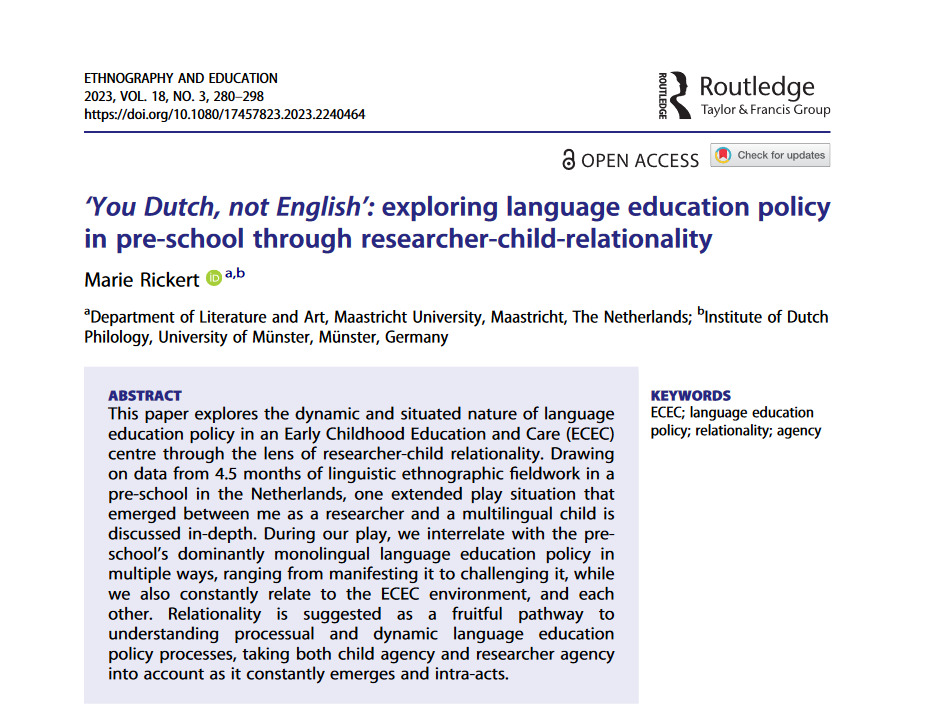
‘You Dutch, not English’: exploring language education policy in pre-school through researcher-child-relationality
Marie Rickert
Ethnography and Education 2023
This paper explores the dynamic and situated nature of language education policy in an Early Childhood Education and Care (ECEC) centre through the lens of researcher-child relationality. Drawing on data from 4.5 months of linguistic ethnographic fieldwork in a pre-school in the Netherlands, one extended play situation that emerged between me as a researcher and a multilingual child is discussed in-depth. During our play, we interrelate with the pre-school’s dominantly monolingual language education policy in multiple ways, ranging from manifesting it to challenging it, while we also constantly relate to the ECEC environment, and each other. Relationality is suggested as a fruitful pathway to understanding processual and dynamic language education policy processes, taking both child agency and researcher agency into account as it constantly emerges and intra-acts.
-

‘You don’t know how to say cow in Polish’. –Co-creating and navigating language ideological assemblages in a linguistically diverse kindergarten in Germany
Marie Rickert
International Journal of Multilingualism Oct 2023
This study examines how language ideologies are negotiated and navigated in a linguistically diverse kindergarten group in Germany, focusing on the multilingual language practices of teachers and children. Drawing on data generated during 3 months of focused linguistic ethnographic fieldwork, I analyse situations in which children and teachers actively include languages other than German into the kindergarten discourse through, e.g. translation requests, switches to family languages, and references to family languages. An ethnomethodological approach is adopted to trace how participants locally assign meanings to different languages and language use in interaction. The findings show that teachers and children express various, at times opposing language ideologies, leading to the dynamic formation of language ideological assemblages. Children position themselves in these assemblages by reworking them and/or foregrounding different aspects of their own multilingual identifications.
-
‘Hoe zeg je “I love you” in jouw taal?’ (Re-) productie van verschillen en diversiteit in het NT2-onderwijs
Marie Rickert
Internationale Neerlandistiek Oct 2023
Dit onderzoek biedt inzicht in de ervaringen, houdingen en taalpraktijken van volwassen cursisten Nederlands als Tweede Taal (NT2) in Nederland met betrekking tot diversiteit in de cursus. Gebaseerd op interviews en les-opnames, verzameld tijdens drie maanden linguïstisch etnografisch veldwerk in twee NT2-cursussen, wordt onderzocht hoe cursisten diversiteit relevant maken in interacties met medecursisten. De bevindingen suggereren dat cursisten soms gebruik maken van een essentialistisch discours, maar ook manieren vinden om dergelijk simplificerend discours te betwisten, waarbij ze vaak hun diversiteit benadrukken als een verenigend element. Het onderzoek biedt waardevolle informatie voor NT2-docenten, docentenopleiders en lesboekenauteurs om het doel van intercultureel leren en inclusief NT2-onderwijs te benaderen.
2022
-
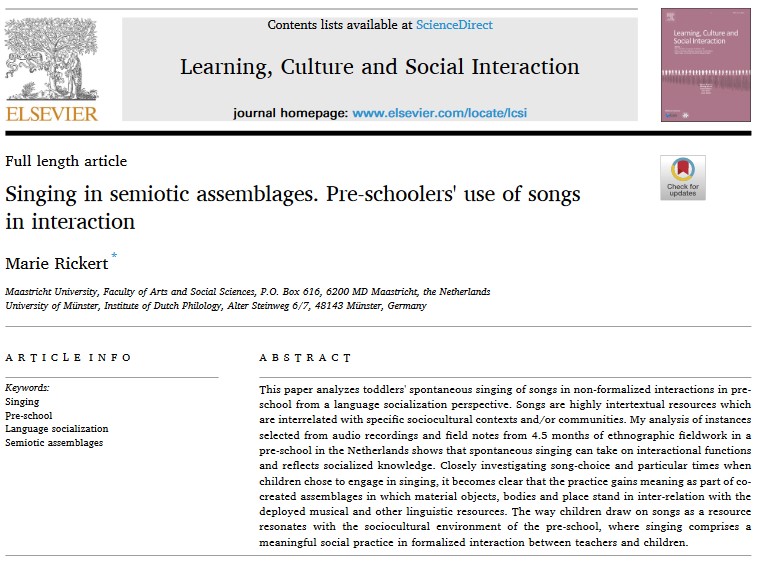
Singing in semiotic assemblages. Pre-schoolers’ use of songs in interaction
Marie Rickert
Learning, Culture and Social Interaction Oct 2022
This paper analyzes toddlers’ spontaneous singing of songs in non-formalized interactions in pre-school from a language socialization perspective. Songs are highly intertextual resources which are interrelated with specific sociocultural contexts and/or communities. My analysis of instances selected from audio recordings and field notes from 4.5 months of ethnographic fieldwork in a pre-school in the Netherlands shows that spontaneous singing can take on interactional functions and reflects socialized knowledge. Closely investigating song-choice and particular times when children chose to engage in singing, it becomes clear that the practice gains meaning as part of co-created assemblages in which material objects, bodies and place stand in inter-relation with the deployed musical and other linguistic resources. The way children draw on songs as a resource resonates with the sociocultural environment of the pre-school, where singing comprises a meaningful social practice in formalized interaction between teachers and children.
-
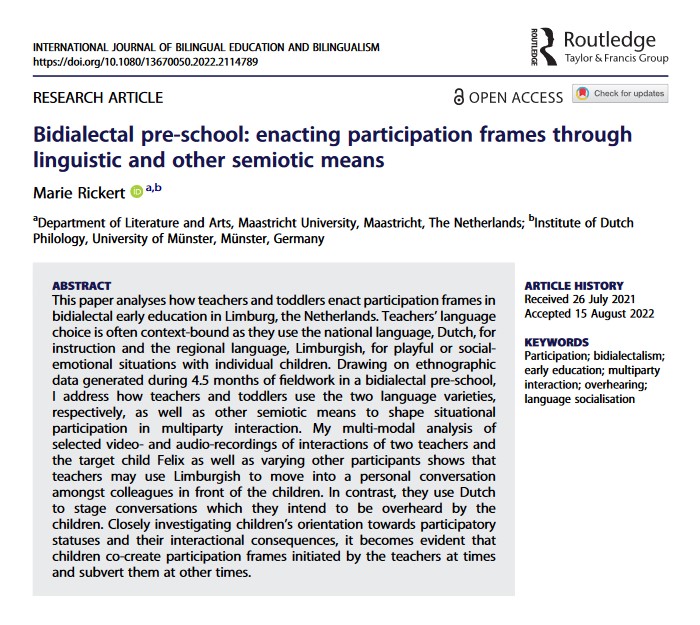
Bidialectal pre-school: enacting participation frames through linguistic and other semiotic means
Marie Rickert
International Journal of Bilingual Education and Bilingualism Oct 2022
This paper analyses how teachers and toddlers enact participation frames in bidialectal early education in Limburg, the Netherlands. Teachers’ language choice is often context-bound as they use the national language, Dutch, for instruction and the regional language, Limburgish, for playful or social-emotional situations with individual children. Drawing on ethnographic data generated during 4.5 months of fieldwork in a bidialectal pre-school, I address how teachers and toddlers use the two language varieties, respectively, as well as other semiotic means to shape situational participation in multiparty interaction. My multi-modal analysis of selected video- and audio-recordings of interactions of two teachers and the target child Felix as well as varying other participants shows that teachers may use Limburgish to move into a personal conversation amongst colleagues in front of the children. In contrast, they use Dutch to stage conversations which they intend to be overheard by the children. Closely investigating children’s orientation towards participatory statuses and their interactional consequences, it becomes evident that children co-create participation frames initiated by the teachers at times and subvert them at other times.
-
[Review of the book] Research Methods in Linguistic Anthropology, SM Perrino & SE Pritzker (Eds.).
Marie Rickert
Oct 2022
2021
-
Categorisation as Positioning-Practice in a Dutch as Second Language Classroom
Marie Rickert
Journal of Language, Identity & Education Oct 2021
ABSTRACTThis article explores how teachers and learners in a Dutch as Second Language (L2) classroom in the Netherlands make sense of themselves, one another, and thereby of the diversity encountered in the class, through practices of categorisation and positioning regarding nationality, place, and culture. Categories raised during class gain meaning in interaction. Teachers and learners engage in positioning by assigning someone a relational location within or outside a respective group or category. It becomes clear that this way of social sense-making happens embedded in or alongside teaching and learning activities in the context of the L2 classroom where using and learning a language unfold as interconnected processes.


